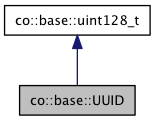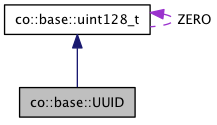Provides a universally unique identifier. More...
#include <uuid.h>
 Inheritance diagram for co::base::UUID:
Inheritance diagram for co::base::UUID: Collaboration diagram for co::base::UUID:
Collaboration diagram for co::base::UUID:Public Member Functions | |
| UUID (const bool generate=false) | |
| Construct a new universally unique identifier. | |
| UUID (const uint64_t high_, const uint64_t low_) | |
| Construct a new universally unique identifier. | |
| UUID (const uint128_t &from) | |
| Construct a new universally unique identifier from an unsigned 128 bit integer value. | |
| UUID & | operator= (const std::string &from) |
| Assign another UUID from a string representation. | |
| bool | isGenerated () const |
Detailed Description
Provides a universally unique identifier.
Not to be subclassed.
Constructor & Destructor Documentation
| co::base::UUID::UUID | ( | const bool | generate = false | ) | [inline, explicit] |
Construct a new universally unique identifier.
If generate is set to true, a new UUID is allocated. Otherwise the UUID is cleared, i.e., it is equal to UUID::ZERO.
- Version:
- 1.0
Definition at line 44 of file uuid.h.
References co::base::RNG::get(), co::base::uint128_t::high(), and co::base::uint128_t::low().
 Here is the call graph for this function:
Here is the call graph for this function:| co::base::UUID::UUID | ( | const uint64_t | high_, |
| const uint64_t | low_ | ||
| ) | [inline] |
| co::base::UUID::UUID | ( | const uint128_t & | from | ) | [inline] |
Member Function Documentation
| bool co::base::UUID::isGenerated | ( | ) | const [inline] |
- Returns:
- true if the UUID was generated.
Definition at line 73 of file uuid.h.
References co::base::uint128_t::high().
 Here is the call graph for this function:
Here is the call graph for this function:| UUID& co::base::UUID::operator= | ( | const std::string & | from | ) | [inline] |
Assign another UUID from a string representation.
- Version:
- 1.0
Reimplemented from co::base::uint128_t.
The documentation for this class was generated from the following file:




 1.2.1 by
1.2.1 by
 1.8.0
1.8.0